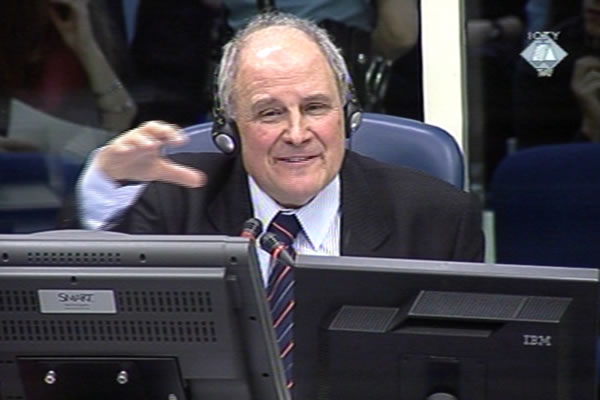Home
PRESIDENT OF ‘COMMITTEE FOR TRUTH’ ABOUT KARADZIC TESTIFIES IN HIS DEFENSE
Belgrade law professor Kosta Cavoski supported the defense’s argument that Alija Izetbegovic was responsible for the war in BH. Cavoski said that Serbs established crisis staffs before the conflict broke out because they were ‘far-sighted’, not because they had planned to capture the territories they claimed were theirs by force, Cavoski said. The witness admitted that he had sent letters and editions of the journal Christian Thought to Karadzic while he was on the run. The fugitive replied ‘rarely and with delay’
 Kosta Cavoski, defence witness of Radovan Karadzic
Kosta Cavoski, defence witness of Radovan Karadzic A member of the Serb Academy and retired law professor Kosta Cavoski testified today as Radovan Karadzic’s defense expert. Cavoski’s task was to refute the allegations made by two prosecution experts, historian Robert Donia and political analyst Patrick Traynor. In his report Donia argued that the Bosnian Serb leadership intended to separate their ethnic community from the other ethnicities in BH through war and violence. Traynor underscored in his report the crucial role of the accused in the military and political structure that pursued the war.
As Professor Cavoski explained, he went through the reports prepared by Donia and Traynor looking for ‘material errors, inconsistencies, omitted facts and occasional maliciousness’ to prove that their arguments were unacceptable. Cavoski criticized Donia and Traynor for concluding that the Bosnian Serb leadership planned to implement their goals through force. In Cavoski’s view, the Bosnian Muslim leader Alija Izetbegovic was responsible for the war because he first accepted and then rejected Cutilheiro’s plan for the cantonization of BH. The defense expert made ‘a creditable claim’ that the real truth about the break-up of Yugoslavia will be known in 30 years, once the US, British and German confidential files are declassified.
The prosecution experts claimed that the plan to force the solution was obvious from a document produced by Karadzic’s Serbian Democratic Party, known as Variant A and B. The document envisaged the establishment of crisis staffs and the takeover of power in the municipalities that were claimed by the Serbs, regardless of whether they were in the majority or not. Cavoski argued that the crisis staffs were established in accordance with the Law on All People’s Defense. The Serbs formed them because they were ‘far-sighted’ and knew that the war would break out, Cavoski argued. The prosecution doesn’t deny that the Serbs were indeed far-sighted: the Bosnian Serb leadership knew that the war would break out because that was their plan. The Belgrade professor contends that the Muslims and Croats established their paramilitary units first; the Serbs established a legitimate army ‘from the remnants of the JNA’.
As a long-term president of the Committee for the Truth about Radovan Karadzic, the witness said that he didn’t know where the accused was hiding. He thought Karadzic was abroad, Cavoski noted, but it turned out that ‘unfortunately he was not’. The Committee published the ‘political works’ of the accused in six volumes and launched ‘wonderful initiatives’, such as the two declarations calling for the withdrawal of the indictment against Karadzic. The accused asked Cavoski to state who signed the declarations. The professor obliged, listing the then Serb Orthodox patriarch Pavle first, followed by the Academy members Smilja Avramov, Milorad Ekmecic, Mihailo Markovic and Dejan Medakovic. According to Cavoski, they were the ‘most eminent figures in the Serb nation’.
In the cross-examination, prosecutor Tieger brought up the witness’s public statements that he ‘worked as a volunteer’ for the defense team. In a book by Miroslav Toholj, Miraculous Chronicles of the Night – Correspondence with Radovan Karadzic Cavoski is said to have exchanged correspondence with Karadzic while Karadzic was at large. The Belgrade professor admitted that he did send Karadzic letters and a journal, Christian Thought, through Karadzic’s wife and daughter. Karadzic’s replies arrived rarely and late ‘with profuse apologies’. While Karadzic was in hiding, Cavoski described him in the media as a ‘herald of freedom and a chivalrous king who will not surrender’, the prosecutor said. All these elements could be relevant for the assessment of the defense expert’s possible bias.
In a bid to highlight the witness’s erroneous conclusions about Karadzic’s intentions to solve the BH crisis peacefully, the prosecutor recalled that in his public appearances the accused claimed he had no intentions of signing Cutilheiro’s plan before all Serb strategic goals were fully implemented on the ground. The accused also said that if BH proclaimed independence, he would go to war. Cavoski replied that one should draw ‘a fine line’ between what the politicians’ say in public, when they often don’t speak the truth, and what they actually do.
Kosta Cavoski completed his testimony today. The trial continues on Monday. Karadzic intends to call Stanislav Galic, the wartime commander of the Sarajevo-Romanija Corps, sentenced to life for the terror campaign in Sarajevo.
Linked Reports
- Case : Karadzic
- 2013-04-10 RELIGION DETERMINED MENU IN KULA PRISON RESTAURANT
- 2013-04-09 DODIK BLAMES IZETBEGOVIC, HIGH REPRESENTATIVE AND OTP
- 2013-04-08 AIRBRUSHING SARAJEVO REALITY
- 2013-04-12 BEATINGS ‘WITHOUT RHYME OR REASON’
- 2013-04-15 GENERAL GALIC BEGINS TESTIMONY IN KARADZIC’S DEFENSE
- 2013-04-16 MUSLIMS SHELLED THEIR OWN PEOPLE TO BLAME SERBS
